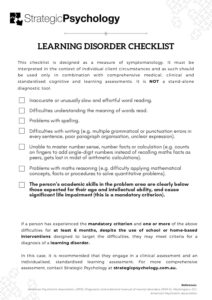
Learning Disorder Checklist
463 KB
This checklist is designed as a measure of symptomatology. It must be interpreted in the context of individual client circumstances and as such should be used only in combination with comprehensive medical, clinical and standardised cognitive and learning assessments. It is NOT a stand-alone diagnostic tool.
This checklist is designed as a measure of symptomatology. It must be interpreted in the context of individual client circumstances and as such should be used only in combination with comprehensive medical, clinical and standardised cognitive and learning assessments. It is NOT a stand-alone diagnostic tool.
Inaccurate or unusually slow and effortful word reading.
Difficulties understanding the meaning of words read.
Problems with spelling.
Difficulties with writing (e.g. multiple grammatical or punctuation errors in every sentence, poor paragraph organisation, unclear expression).
Unable to master number sense, number facts or calculation (e.g. counts on fingers to add single-digit numbers instead of recalling maths facts as peers, gets lost in midst of arithmetic calculations).
Problems with maths reasoning (e.g. difficulty applying mathematical concepts, facts or procedures to solve quantitative problems).
The person’s academic skills in the problem area are clearly below those expected for their age and intellectual ability, and cause significant life impairment (this is a mandatory criterion).
If a person has experienced the mandatory criterion and one or more of the above difficulties for at least 6 months, despite the use of school or home-based interventions designed to target the difficulties, they may meet criteria for a diagnosis of a learning disorder.
In this case, it is recommended that they engage in a clinical assessment and an individualised, standardised learning assessment. For more comprehensive assessment, contact Strategic Psychology to book an appointment on (02) 6262 6157 or email support@strategicpsychology.com.au.
Reference: American Psychiatric Association. (2013). Diagnostic and statistical manual of mental disorders (DSM-5). Washington, D.C.: American Psychiatric Association.
